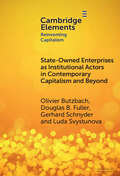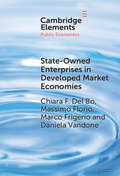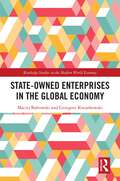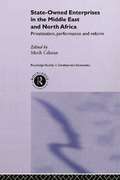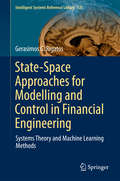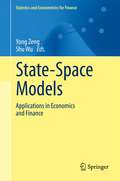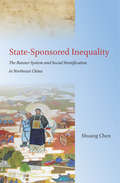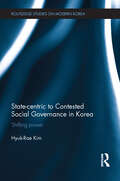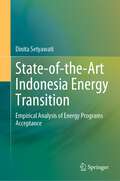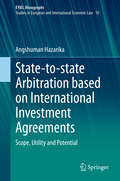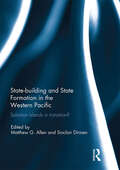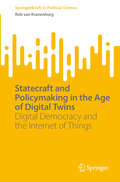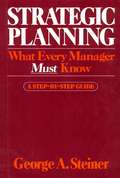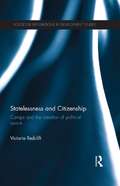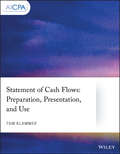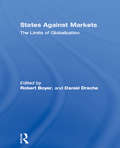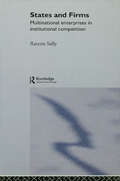- Table View
- List View
State-Owned Enterprises as Institutional Actors in Contemporary Capitalism and Beyond (Elements in Reinventing Capitalism)
by Olivier Butzbach Douglas B. Fuller Gerhard Schnyder Luda SvystunovaThis Element qualifies the common understanding of State-Owned Enterprises (SOEs) as mere instruments of the state and instead conceive of them as economic actors in their own right. Specifically, SOE top management teams have leeway to diverge from goals that the state they are owned by pursues. Through 'institutional work' they can even actively shape the institutional framework in which they are embedded. However, the extent of SOE top management teams' leeway for agency is determined by macro- (country), meso- (State–SOE governance system), and industry-level factors. These factors, in turn, vary from country to country and over time. In other words, SOE agency is 'embedded agency.' Combining institutional work and historical institutionalism analytic lenses, this Element presents a multilevel model to understand embedded agency of top management teams of SOEs in contemporary capitalism. The model adds an important element to our understanding of the 'new state capitalism.'
State-Owned Enterprises in Developed Market Economies: Theory and Empirics (Elements in Public Economics)
by Chiara F. Del Bo Massimo Florio Marco Frigerio Daniela VandoneAfter briefly reviewing the received doctrine prior to the waves of privatisations beginning in the 1980s, this Element offers a survey of various analytical frameworks on State Owned Enterprises (SOEs) from the perspective of applied welfare economics. The focus then shifts to a positive analysis of the comparative performance of private versus public enterprises, with a specific emphasis on SOEs in developed market economies over the past two decades; key metrics examined include profitability, productivity, internationalisation, innovativeness, and environmental sustainability. The Element also addresses empirical methodological issues, alongside contextual conditions and institutional factors that help explain the outcomes. It reviews selected contributions from public economics, industrial organisation, corporate governance, management studies and other social sciences. Overall, the Element aims to redefine a neglected research area in public economics, considering the new circumstances of the twenty-first century, where SOEs compete with other firms in developed market economies.
State-Owned Enterprises in the Global Economy (Routledge Studies in the Modern World Economy)
by Maciej Bałtowski Grzegorz KwiatkowskiState-owned enterprises combine economic activities resulting from their position on the market with non-economic functions determined by the state owner. In many of the world’s major economies, SOEs play an important role, and in some, such as China, India, Russia and Brazil, they are outright dominant. At the same time, the existence of SOEs is largely ignored by economic theory and the current figures on SOEs on a global scale available in the literature are questionable in terms of their methodological validity and thus they do not allow for a proper cross-country analysis. This book fills this research gap. It focuses on the scope and importance of SOEs in a broad group of the largest economies, primarily on a variety of quantitative estimates. It contains the results of an extensive and unique empirical study of 37 of the world’s largest economies over the period from 2009 to 2018. The findings showed that the average share of SOEs - measured by operating revenues and total assets - in the group of the largest hundred enterprises (Top 100) of a given country is nearly 30%, while in the Top 20 group it is even slightly higher. The authors present an econometric analysis showing the relationship between the scope of SOEs and the various economic and non-economic characteristics of the studied set of countries. The book also contains an in-depth discussion of selected key issues, such as the functions of SOEs in various types of economies, the role of SOEs in capital markets and the phenomenon of SOEs with foreign capital. This work is addressed to both academic economists, dealing with macroeconomics and economic policy, as well as researchers and analysts from various international organizations and think-tanks.
State-Owned Enterprises in the Middle East and North Africa: Privatization, Performance and Reform (Routledge Studies in Development Economics #Vol. 18)
by Merih CelasunIn the rapid world-wide spread of privatization, progress in the Middle East and North Africa region has been markedly slow. This volume argues that a high level of overstaffing in public enterprises and the inability of economies to create jobs fast enough is mainly responsible for this. An in-depth study of the facts and a well-supported conclusion makes this an impressive collection of work on a very pertinent subject.
State-Owned Multinationals: Governments in Global Business (JIBS Special Collections)
by Alvaro Cuervo-CazurraThis book provides a deep understanding of state-owned multinationals (SOMNCs) and their role in global business. SOMNCs have emerged as a force to contend with in global competition, and their study connects several fields such as economics, political economy, international business and global strategy. This prestigious collection of articles presents insights into the interaction between government ownership and internationalization, and aims to provoke new research approaches and insights on the topic. The book includes some of the key contributions to our understanding of these firms and new commentaries explaining how to analyze them. This book is essential reading for academics and consultants looking to gain a clearer understanding of SOMNCs and how to research them.
State-Space Approaches for Modelling and Control in Financial Engineering
by Gerasimos G. RigatosThe book conclusively solves problems associated with the control and estimation of nonlinear and chaotic dynamics in financial systems when these are described in the form of nonlinear ordinary differential equations. It then addresses problems associated with the control and estimation of financial systems governed by partial differential equations (e. g. the Black-Scholes partial differential equation (PDE) and its variants). Lastly it an offers optimal solution to the problem of statistical validation of computational models and tools used to support financial engineers in decision making. The application of state-space models in financial engineering means that the heuristics and empirical methods currently in use in decision-making procedures for finance can be eliminated. It also allows methods of fault-free performance and optimality in the management of assets and capitals and methods assuring stability in the functioning of financial systems to be established. Covering the following key areas of financial engineering: (i) control and stabilization of financial systems dynamics, (ii) state estimation and forecasting, and (iii) statistical validation of decision-making tools, the book can be used for teaching undergraduate or postgraduate courses in financial engineering. It is also a useful resource for the engineering and computer science community
State-Space Models: Applications in Economics and Finance
by Yong Zeng Shu WuState-space models as an important mathematical tool has been widely used in many different fields. This edited collection explores recent theoretical developments of the models and their applications in economics and finance. The book includes nonlinear and non-Gaussian time series models, regime-switching and hidden Markov models, continuous- or discrete-time state processes, and models of equally-spaced or irregularly-spaced (discrete or continuous) observations. The contributed chapters are divided into four parts. The first part is on Particle Filtering and Parameter Learning in Nonlinear State-Space Models. The second part focuses on the application of Linear State-Space Models in Macroeconomics and Finance. The third part deals with Hidden Markov Models, Regime Switching and Mathematical Finance and the fourth part is on Nonlinear State-Space Models for High Frequency Financial Data. The book will appeal to graduate students and researchers studying state-space modeling in economics, statistics, and mathematics, as well as to finance professionals.
State-Sponsored Inequality: The Banner System and Social Stratification in Northeast China
by Shuang ChenThis book explores the social economic processes of inequality in nineteenth- and early-twentieth-century rural China. Drawing on uniquely rich source materials, Shuang Chen provides a comprehensive view of the creation of a social hierarchy wherein the state classified immigrants to the Chinese county of Shuangcheng into distinct categories, each associated with different land entitlements. The resulting patterns of wealth stratification and social hierarchy were then simultaneously challenged and reinforced by local people. The tensions built into the unequal land entitlements shaped the identities of immigrant groups, and this social hierarchy persisted even after the institution of unequal state entitlements was removed. State-Sponsored Inequality offers an in-depth understanding of the key factors that contribute to social stratification in agrarian societies. Moreover, it sheds light on the many parallels between the stratification system in nineteenth-century Shuangcheng and structural inequality in contemporary China.
State-centric to Contested Social Governance in Korea: Shifting Power (Routledge Studies on Modern Korea)
by Hyuk-Rae KimIn this interdisciplinary study of governance, Hyuk-Rae Kim traces how civil society and NGOs have evolved over time, how they differ in motivation from their Western counterparts, and the role civil society NGOs have played in consolidating democracy as the governance system in Korea changes from a state-centric to a contested one. This book presents civil society's rise in Korea through in-depth analyses of today's most pressing issues, in order to chart the shifting role of a formerly state-centric to a contested governance system in modern Korea. With detailed case studies and policy discussions, this book explores the role of NGOs in campaigning for political reform and the eradication of political corruption; the provision of public goods and services; challenging the government’s policies on migration; tackling the issue of North Korean refugees and human rights; and the provision of regional environmental governance. These case studies demonstrate that the state is no longer the sole guardian and provider of public institutions and goods and underline the growing role of civil society in Korea. Both a study of contested governance and an exploration of contemporary Korean society, this book will be of imminent interest to students and scholars alike of Korean politics, East Asian politics, governance, and civil society.
State-of-the-Art Indonesia Energy Transition: Empirical Analysis of Energy Programs Acceptance
by Dinita SetyawatiThis book discusses how people can come together to address current energy justice and access poverty problems by examining the relationship between energy systems and society in diverse energy sources. The novelty of this book is that this is the only complete guide for readers who wish to understand the status of Indonesia’s energy transition and renewable energy development. Energy programs that are explored are the ones prioritized by government administrations, including coal, nuclear power, solar energy, green electricity, and geothermal energy. Based on extensive fieldwork and empirical data, the book combines insights from historical data on energy subsidies and economic diversification, current empirical data on social acceptance of new energy technologies, and contemporary studies that forecast the implications of the transition to the coal industry and fossil fuel subsidies. It asks how Indonesia has enacted policies that support energy transition. How do the public and civil society view those policies? What are the implications for broader themes and discussions on energy sources, technology, systems, policies, and service? Strategies are suggested to advance a sustainable transition in the developing world that will mitigate developmental risks associated with the transition away from fossil fuels while encouraging decision making in a sustainable and socially just manner. This book is an informative and engaging read for a general audience as well as a valuable resource for scholars, researchers, and students in environmental and energy studies.
State-to-state Arbitration based on International Investment Agreements: Scope, Utility and Potential (European Yearbook of International Economic Law #10)
by Angshuman HazarikaThis book discusses the use of the compromissory clause in international investment agreements (IIAs) for interstate dispute resolution. It puts forward the possibility of using state-to-state arbitration based on the compromissory clause in IIAs as an alternative means of resolving investment disputes in light of the global debate on the shortcomings of investor-state arbitration. The book’s main conclusion is that state-to-state arbitration may be used as an alternative to currently popular investor-state arbitration by resolving procedural hurdles which impede its acceptance. It becomes more important with the removal of investor-state arbitration as an option in certain recent IIAs, which then elevates state-to-state arbitration as the sole option for binding third party dispute resolution in the treaty. Even then, it is unlikely to replace investor-state arbitration completely due to its inherent shortcomings, such as the risk of re-politicising disputes and a lack of direct control over the process for the affected investors. Nevertheless, the availability of an alternative forum will benefit all parties involved, as they will no longer be wholly dependent on investor-state arbitration, which can be affected by events such as denunciation from the ICSID Convention or the refusal of a host state to enforce an arbitration award.
Statebuilding and State Formation in the Western Pacific: Solomon Islands in Transition?
by Matthew G. Allen Sinclair DinnenThis book provides a rigorous and cross-disciplinary analysis of this Melanesian nation at a critical juncture in its post-colonial and post-conflict history, with contributions from leading scholars of Solomon Islands. The notion of ‘transition’ as used to describe the recent drawdown of the decade-long Regional Assistance Mission to Solomon Islands (RAMSI) provides a departure point for considering other transformations – social, political and economic –under way in the archipelagic nation. Organised around a central tension between change and continuity, two of the book’s key themes are the contested narratives of changing state–society relations and the changing social relations around land and natural resources engendered by ongoing processes of globalisation and urbanisation. Drawing heuristically on RAMSI’s genesis in the ‘state- building moment’ that dominated international relations during the first decade of this century, the book also examines the critical distinction between ‘state-building’ and ‘state formation’ in the Solomon Islands context. It engages with global scholarly and policy debates on issues such as peacebuilding, state-building, legal pluralism, hybrid governance, globalisation, urbanisation and the governance of natural resources. These themes resonate well beyond Solomon Islands and Melanesia, and the book will be of interest to a wide range of students, scholars and development practitioners. This book was previously published as a special issue of The Journal of Pacific History.
Statecraft and Policymaking in the Age of Digital Twins: Digital Democracy and the Internet of Things (SpringerBriefs in Political Science)
by Rob van KranenburgThis book describes the transition from basic automation to pervasive computing, ubiquitous computing, ambient intelligence, and the Internet of Things, and its effects on democratic decision-making and governance in Europe. It diagnoses a lack of political agency and technical capabilities in the West that has accelerated the end of the model of entrepreneurial government in favor of a new paradigm: Cyber-physical Systems. Offering an analysis of the digital transformation process in various industries and institutions, the book highlights the severe repercussions and impacts on democratic decision-making and the legitimacy of the Westphalian model of the nation-state. Readers will learn how the convergence of cloud systems, data platforms, and connected objects is facilitating this transformation process, one characterized by a virtual representation of every person, object, and machine – a digital twin. The book argues for balancing centralization and decentralization in a cybernetic framework with human-centric values at its core. Further, it proposes a political framework that aims to develop a next-generation internet for the five hundred million citizens of Europe, one capable of enforcing and promoting digital hegemony while safeguarding the rights and proactive capabilities of said citizens. In closing, the book makes the case for a (6G) phone/hardware wallet built on European chip requirements and platforms and running on its own OS to promote technical European integration on infrastructure, applications, and services. Given its scope, the book will appeal to policymakers and practitioners interested in European digital governance and autonomy, as well as scholars of public administration, public policy, and political science.
Statecraft: The Modern State in China and India
by Tarun KhannaThis chapter examines the evolution of the Chinese and Indian governments over the last half-century and the political legacies each country struggles with as it opens up to the twenty-first century.
Stated Choice Methods: Analysis and Applications
by David A. Hensher Jordan J. Louviere Joffre D. SwaitUnderstanding and predicting the behaviour of decision makers when choosing among discrete goods has been one of the most fruitful areas of applied research over the last thirty years. An understanding of individual consumer behaviour can lead to significant changes in product or service design, pricing strategy, distribution channel and communication strategy selection, as well as public welfare analysis. This graduate and practitioner guide, first published in 2000, deals with the study and prediction of consumer choice behaviour, concentrating on stated preference (SP) methods - placing decision makers in controlled experiments that yield hypothetical choices - rather than revealed preferences (RP) - actual choices in the market. It shows how SP methods can be implemented, from experimental design to econometric modelling, and suggests how to combine RP and SP data to get the best from each type. The book also presents an update of econometric approaches to choice modelling.
Stategic Planning
by George A. SteinerIn today's complex world of business, strategic planning is indispensable to effective management. Ever since the mid-1950's, when American companies began to develop formal long-range planning systems, wise managers have understood the importance of knowing where their firm was headed and how it intended to get there. To function effectively in a modern, planned operation, every manager must have a practical understanding of how the planning process works. That's exactly what this book offers: a step-by-step guide to strategic planning. George A. Steiner, a well-known expert in the field of management, provides a concise, jargon-free handbook that avoids abstract theory and takes you straight to the "how-to" of planning. Whether you're designing and implementing a new plan or working with a plan that's already in operation, Strategic Planning puts the information you need at your fingertips. It takes you through every stage of the process, from idea to execution to evaluation. (And explains "Fifty Common Pitfalls" you'll need to know about.) You can plug your own data into the lucid charts, tables, and checklists for a valuable start on getting organized and evaluating your planning needs. And there's plenty of penetrating discussion about the questions and quandaries you're likely to meet along the way. For example: * How do you identify, evaluate, and implement strategies? * How do you design a planning system to fit the unique characteristics of you and your company? * Can an intuitive manager do formal strategic planning? * What are some ways to develop clear objectives? * What human behavior factors can endanger planning and how can managers overcome them? * How, and when, should a situation audit be made? * What do you need to know about computer models? * How can business planning lessons be applied to not-for-profit organizations? * How can managers apply lessons of planning experience to the planning of their own careers? You don't have to get an advanced degree to make strategic planning a part of your management style. All you need is the expert advice in this idea-packed handbook. (As a bonus the book includes a glossary of the terms, tools, and techniques of strategic planning.)
Stateless Commerce: The Diamond Network and the Persistence of Relational Exchange
by Barak D. RichmanHow does Manhattan’s 47th Street diamond district thrive as an ethnic marketplace without lawyers, courts, and state coercion? Barak Richman draws on insider interviews to show why relational exchange based on familiarity, trust, and community enforcement succeeds and what it reveals about the modern state’s limitations in governing the economy.
Statelessness and Citizenship: Camps and the Creation of Political Space (Routledge Explorations in Development Studies)
by Victoria RedcliftWhat does it mean to be a citizen? In depth research with a stateless population in Bangladesh has revealed that, despite liberal theory’s reductive vision, the limits of political community are not set in stone. The Urdu-speaking population in Bangladesh exemplify some of the key problems facing uprooted populations and their experience provides insights into the long term unintended consequences of major historical events. Set in a site of camp and non-camp based displacement, it illustrates the nuances of political identity and lived spaces of statelessness that Western political theory has too long hidden from view. Using Bangladesh as a case study, Statelessness and Citizenship: Camps and the creation of political space argues that the crude binary oppositions of statelessness and citizenship are no longer relevant. Access to and understandings of citizenship are not just jurally but socially, spatially and temporally produced. Unpicking Agamben’s distinction between ‘political beings’ and ‘bare life’, the book considers experiences of citizenship through the camp as a social form. The camps of Bangladesh do not function as bounded physical or conceptual spaces in which denationalized groups are altogether divorced from the polity. Instead, citizenship is claimed at the level of everyday life, as the moments in which formal status is transgressed. Moreover, once in possession of ‘formal status’ internal borders within the nation-state render ‘rights-bearing citizens’ effectively ‘stateless’, and the experience of ‘citizens’ is very often equally uneven. While ‘statelessness’ may function as a cold instrument of exclusion, certainly, it is neither fixed nor static; just as citizenship is neither as stable nor benign as the dichotomy would suggest. Using these insights, the book develops the concept of ‘political space’ – an analysis of the way history and space inform the identities and political subjectivity available to people. In doing so, it provides an analytic approach of relevance to wider problems of displacement, citizenship and ethnic relations.Shortlisted for this year’s BSA Philip Abrams Memorial Prize.
Statement of Cash Flows
by Jacob Cohen David F. HawkinsDiscusses the components of the statement of cash flow and its direct and indirect format of presentation. Also briefly explains the difference between cash and accrual accounting and provides examples of Standard Microsystems Corp. and Intel Corp.
Statement of Cash Flows: Preparation, Presentation, and Use (Aicpa Ser.)
by Tom KlammerStatement of Cash Flows: Preparation, Presentation, and Use by Tom Klammer
Statements of Cash Flows: Three Examples
by William J. Bruns Jr. Julie H. HertensteinThis case introduces the statement of cash flow through three examples of multi-year statements of cash flows from three unidentified companies.
Statements of Cash Flows: Three Examples
by William J. Bruns Jr. Julie H. HertensteinThis case introduces the statement of cash flow through three examples of multi-year statements of cash flows from three unidentified companies.
States Against Markets: The Limits of Globalization (Routledge Studies in Governance and Change in the Global Era)
by Daniel Drache Robert BoyerThis work challenges the popular view that globalization threatens the role of the nation-state in determining national policy. It examines the fundamental issue of competitiveness and market power in an increasingly borderless and co-dependent world. Despite this increased threat to the nation-state as an effective manager of the national economy, the authors argue that there are a number of options and alternatives open to governments to protect themselves from the global business cycle.
States and Firms: Multinational Enterprises in Institutional Competition (Routledge Studies in International Business and the World Economy #1)
by Razeen SallyFirst published in 1995. Routledge is an imprint of Taylor & Francis, an informa company.
States and Markets in Hydrocarbon Sectors
by Andrei V. Belyi Kim TalusResearch on the role of states and markets in the hydrocarbon sector is highly topical in contemporary International Political Economy. This edited collection will approach this subject from a broader perspective, investigating the very essence of the interaction between the state and the market and how this varies on a regional basis.
